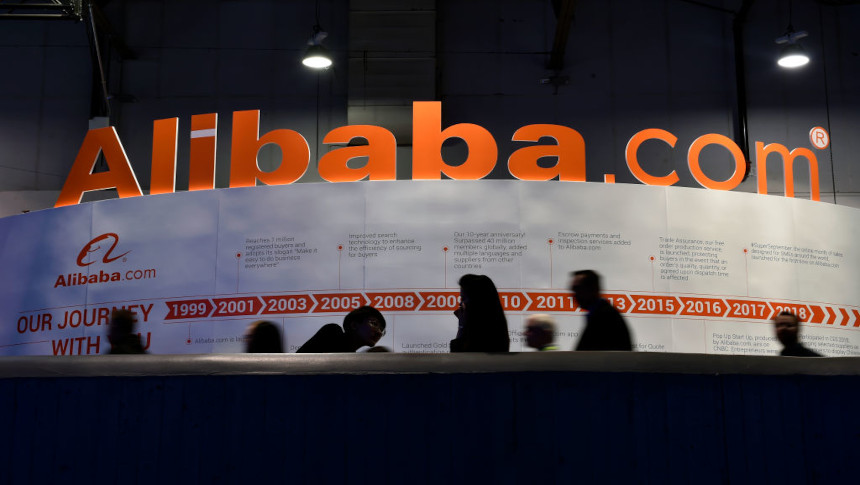Hong Kong media South China Morning Post reported on December 19 that on Sunday (December 18), the new provincial party secretary of Zhejiang Province inspected the Alibaba headquarters park, highlighting his support for the e-commerce giant.
Yi Lianhong, the newly appointed secretary of the Zhejiang Provincial Party Committee of the Communist Party of China, urged Alibaba to “strive to be a model student of standardized development and a leader in innovative development,” according to Zhejiang’s official media “Zhejiang Daily”.
Yi Lianhong is the first senior Chinese government official to visit since Alibaba was under antitrust investigation by Chinese regulators two years ago. Notably, the Chinese government has signaled a policy shift.
Last Friday (December 16), the Central Economic Work Conference chaired by Xi Jinping announced that it would encourage China’s big technology platform companies, such as Alibaba, to “show their talents in leading development, creating jobs, and competing internationally.”
Nan Zao reported that this shows that the Chinese government has ended the regulatory storm against technology giants such as Alibaba and will look to Internet platforms to play a role in revitalizing the slowing Chinese economy.
The report believes that while the attitude towards the platform economy has changed, the Chinese government is shifting its policy focus to economic development, because the strict epidemic control and regulatory campaign has dampened investor confidence in the Chinese market.
Zhou Hao, chief economist at Guotai Junan International, believes that “the most encouraging sign for global investors is that the Chinese Communist Party’s policymakers have made clear statements on equal treatment of private and state-owned enterprises.”
On Sunday (December 18), Yi Lianhong also visited Zhijiang Lab, a research institute co-founded by the Zhejiang provincial government, Zhejiang University and Alibaba.
According to a Hong Kong 01 report, after the meeting closed, more than a dozen provincial party secretaries returned to their provinces and held a meeting, where they proposed three key words: openness, confidence, and investment expansion.
The Chinese Communist Party’s economic conference has changed its direction, and the zero-zero policy that hinders China’s economy has also been fully relaxed.
Central News Agency reported on December 19 that the outbreak of the epidemic has exploded in China since the relaxation of epidemic prevention and control. Today, it reported the first death from the epidemic, and only 2 cases. The audio and video of the corridor has already been widely circulated on the Internet.
The report pointed out that if the online videos are true, there are more than two new deaths from the CCP virus, but the official has never come forward to refute or clarify the rumors.
In addition, there have been at least three deaths from the epidemic recently exposed by the Chinese media alone. They are former Shenyang Jinde player Wang Ruoji, who died at the age of 37 due to the deterioration of his underlying disease (diabetes) due to the epidemic.
According to Caixin.com, two senior Chinese media professionals, former People’s Daily reporter Yang Lianghua and former China Youth Daily deputy editor-in-chief Zhou Zhichun also died of the virus recently.
The British Broadcasting Corporation (BBC) reported in Chinese that the people’s persistent anxiety about the epidemic in the past three years has made China’s economic recovery not as fast as expected.
Lu Ting, Chief Economist of Nomura China, said, “A country’s impact on the current economy cannot be underestimated when the number of infection cases is rising rapidly, especially when the people still have a certain fear of infection.”
Julian Evans-Pritchard, senior China economist at Capital Economics, believes that China will take quite a while to adapt to co-existing with the virus, and consumption activities may take between 3 and 10 months. After 6 months, it can return to a “similar to normal state”.
He judged, “So, in the medium term, even if the ‘clearing’ policy shift will benefit most companies, it will not provide immediate relief (economic distress), and the next few months will remain very challenging.”
According to Morgan Stanley’s analysis, economic growth may not be satisfactory in the short term, but growth will improve next spring, and a more meaningful rebound will occur in the second half of next year. The annual growth in 2023 is estimated to reach 5%.
Rich Nuzum, president of Mercer’s global wealth and investment business, said, “The blockade means that people cannot travel, cannot consume, cannot work. It may not be humane to say this, but in terms of GDP, the impact of the blockade is greater than the impact of the virus. Much bigger.”
Ming Pang, Chief Economist for Greater China at JLL, warned that reopening may bring inflationary challenges to China,… and during the rapid rise in the number of confirmed cases of the CCP virus, labor, production and supply The chain is subject to short-term disturbances.
